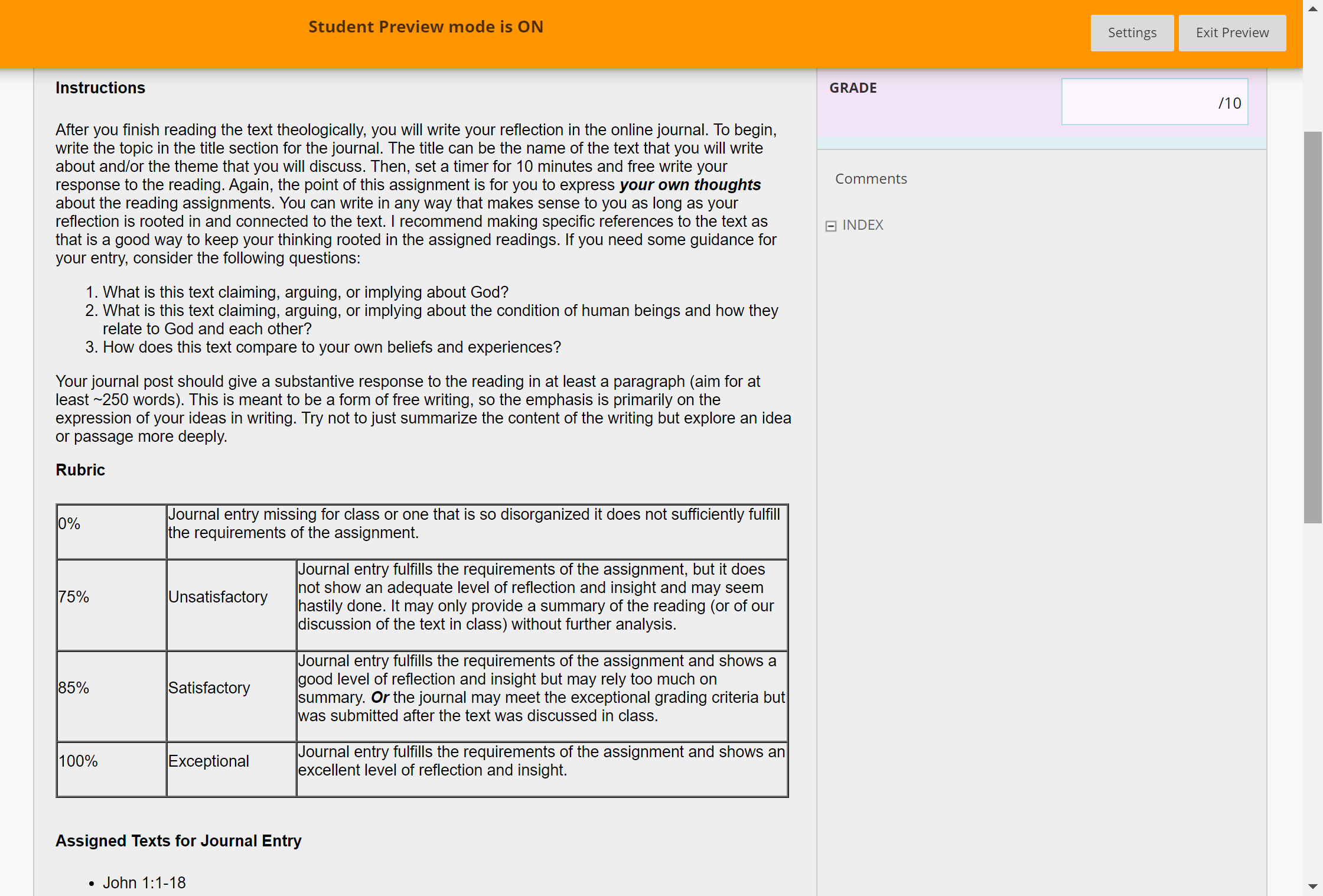
Teaching through Journaling
One of the tools I find essential for teaching is journaling. I recently wrote about how I journal for my own research, and I have incorporated the same practice in my teaching. When I teach introductory religious studies classes, for example, the course objective I focus most on is helping students learn how to read and interpret religious texts. In the end, whether the students retain what they’ve learned about—for example—early church heresies and the Christian understanding of the Trinity, the skill of being able to read a religious text and understand the author’s ideas about God can be more broadly applicable. Journaling assignments are an effective way to get students to actively think about their reading and class content instead of just glossing over it as they prepare for class or trying to passively retain it. As I note in my assignment guidelines, journals are powerful tools of reflection, that is, “the process whereby we reconstruct and make meaning of our experience.”[1] Journaling also helps students become better writers, both by providing the space to think through ideas informally and by helping build writing motivation and fluency.
I use journals in undergraduate and graduate classes, but in what follows I will provide practical guidelines based on how I’ve used journals in introductory courses. For more examples and ideas, I highly recommend the book Journal Keeping by Dannelle D. Stevens and Joanne E. Cooper that I quoted above.
In my introductory religious studies course, “The Christian Tradition,” I have students write reading response journals using the journal feature on Blackboard, a practice I began during the pandemic. The accompanying image is a screenshot of the instructions for the journal that students see on Blackboard.

For this, students free write their responses to the reading assignments before class. The class meets twice a week, but I only require the journal entry to be done once a week unless students are absent, in which case they must do their journal entry for the class they missed. I emphasize that I am not looking for students to be “right” or “wrong” about their interpretation, but to engage with and respond to what the text says from their perspective. I ask them to complete this before the class to prepare them for our discussion. One change I implemented this past semester was to delay this at-home journaling until the fourth week. Instead, we did journal entries in class after the discussion, and I provided written feedback to help the students learn this skill. After we did this in class, I could use the Blackboard rubric to give minimal feedback on their online journal entries. Because students in this class only write one entry a week, I read and grade every single entry they complete.
In contrast, in an interdisciplinary general education course that I teach titled “Discovering the Self in the Universe,” I ask students to use a physical journal just for that class. They write responses to the reading assignments, but they also use the journal for in-class reflection. This class is writing intensive, so students do much more journaling than I require in “The Christian Tradition.” Because the students are writing more, I do not read every entry in this case. For grading, I collect the journals three times during the semester and check for completeness (50 percent of the grade), then read five entries which I grade for quality (50 percent of the grade), having provided them with a simple rubric at the beginning of the semester.
Students generally respond positively to the journal. In last semester’s final course evaluations, in response to the question on what was most effective about the class, several students mentioned journaling. Students noted that this assignment “helped me examined [sic] the text more closely” and “really helped me express my opinion and also remember what we did in earlier sessions.” I was teaching “Discovering the Self in the Universe” for the first time, and in that class one of my students, Sebastian Derflinger (name used with permission), chose to do his final presentation—about what was most beneficial for them in the course—on the practice of journaling. Derflinger is from Austria, so he noted that the ability to write freely in English without worrying about mistakes was a particular benefit for him. He also noted the importance of building the habit of journaling to improve how he expresses his thoughts, record important ideas, and go deeper into the course content. He said that journaling in my class led him to start a private journal about his goals, experiences, and thoughts. These are just a few examples of student responses, but they give a sense of the positive responses I receive about this. I am thus a huge proponent of journaling, both for myself and for my students.
[1] Dannelle D. Stevens and Joanne E. Cooper, Journal Keeping: How to Use Reflective Writing for Learning, Teaching, Professional Insight, and Positive Change (Sterling, VA: Stylus, 2009) 3.
Leave a Reply